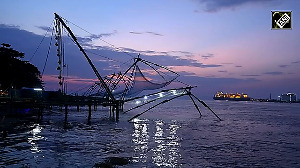Strobe Talbott, former United States deputy secretary of state who laid the foundation for better US-India ties, on how they can be taken higher.
I acknowledge India's emergence as a dynamic global economic power. I also acknowledge the extraordinary role played by Prime Minister Manmohan Singh. I had the honour of meeting him when I was here as a diplomat in the early 1990s, when he was the finance minister.
 |
He, with the indispensable support of the private sector, opened India to the world.
I will concentrate on our regional and global challenges. Climate change is an existential threat where India and the US not only can work together but must work together. Both are committed to the UN process on climate change.
We must continue the process but it is not moving fast enough. It is very important for the US and India to work out bilateral and global policy, particularly with the European Union and China.
India is undertaking major innovations in solar, bio-fuel, fuel gas, clean coal, green infrastructures and of course, in nuclear energy areas. This raises an organic and absolutely indispensable connection between development, peaceful nuclear energy and strengthening of the global non-proliferation regime.
One of the gratifying things I found on the subject in my conversations in India is there is zero temptation to re-argue issues. We haven't heard too many debates about the Non-Proliferation Treaty or the civilian nuclear deal.
That's the way it should be. Because, both these are done deals. Both of them are going to be around for a long time. That means we will have to work together in reconciling the NPT.
We should see them as complimentary and not see as an either-or account. The NPT has 187 states parties; the civil nuclear deal has two state parties.
The civilian nuclear deal has become a symbol of the new level of engagement between the two democracies that are no longer strangers to each other.
Now, let us implement mutually acceptable measures that would assure safety, protection of our interests, strong export control and other measures that are necessary to strengthen the non-proliferation regime in the world. The measures respect India's sovereignty and its sovereign rights not to be bound by the NPT.
A quick word on regional and global multilateral architecture or, as some say, global governance. On reading the Indian press, I know there is a lot of curiosity on whether the issue of permanent membership in an expanded United Nations Security Council will come up.
Maybe it will, maybe it won't. I think the UNSC issue for India is a little bit like a check that runs the some risk of bouncing for not being encashable for a long time to come.
I hope both governments will continue to work for existing structures at the regional level. For example, it is significant that Secretary (of State Hillary) Clinton and your prime minister had time together at the East Asia Summit working together for the Afghan regional forum.
Looking ahead, at the G-20, it is a terrific opportunity for India to partner with the US on various issues. That would require some adjustment from both.
For the US, it will be going a bit away from the G-7 and for India, if I may say so, it would be to go away a little from the G- 77, and the non-aligned movement.
Talking about counter-terrorism, let me say 26/11 was a wake up call for both our governments. My sense here is that we are getting beyond the post-mortem of the David Headley affair and upgrading co-ordination and co-operation on counter-terrorism.
When I was at the Taj in Mumbai, I saw Indian and American security officials having breakfast and discussing things to assure that this visit goes well. I think that was symbolic in the most powerful way.
Talking about India's two nuclear-power neighbours, the one on the northeast (China) was a subject of intense conversation between Secretary Clinton and Prime Minister Singh.
They also spoke with their Chinese counterparts in Hanoi. It was described as a businesslike and candid conversation and we know what they mean. We have lots of concerns. I hope that triangle relationship of India-US-China will be put to conversation during President Obama's visit. We need to talk candidly with each other.
Talking about your neighbour in the northwest, I learnt when I was here in the 90s that the hyphen is the least respectable computation point, if I can put it that way.
I will never hyphenise India and Pakistan. Okay, fair enough. I learnt that lesson. But, I do think the hyphen is justified when one is talking about Afghanistan and Pakistan.
In fact, in American vocabulary those two words are not only hyphenated but they are now also contracted into a single noun, Af-Pak.
It is not an issue of terminology. It is an issue of geopolitics of the region. We need to understand each other's concerns in the region. The Track- II process is doing a good job of it.
Talking about domestic politics, I see a tendency in the media in both countries to write the political obituary of the US president. I think it is premature.
It is absolutely true that the US president is facing big troubles. He is facing problems that he inherited when he came to office.
The economy in the US is not in good shape. In terms of economy, the politically vehement statistic is the unemployment figure. In addition, there is disarray and demoralisation amongst the Democrats and the opposite amongst Republicans.
The Republican Party has been energised by the Tea Party. There are no doubts that the President will be facing increasing obstacles in coming days.
Excerpted from former US deputy secretary of state Strobe Talbott's address at a dialogue on 'US-India Strategic Partnership' organised by the Federation of Indian Chambers of Commerce and Industry and the Brookings Institution in New Delhi, November 2.






 © 2025
© 2025